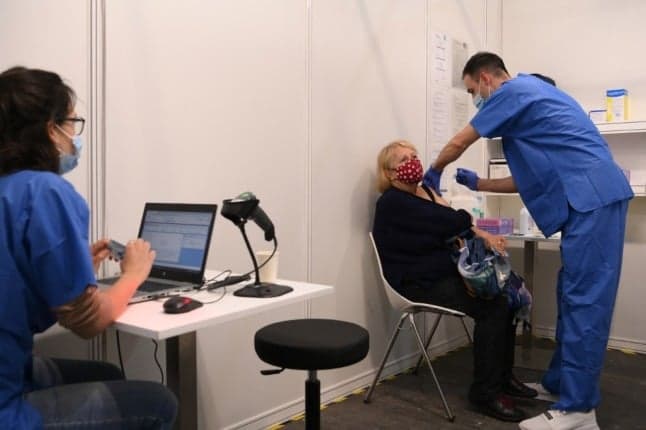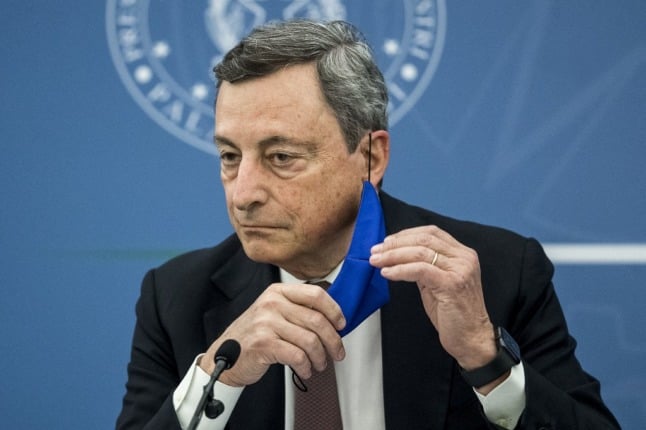‘More vaccines or new closures’: Italy to decide on mandatory jabs this month, say ministers

The Italian government will decide by the end of September whether vaccines will become mandatory for all people aged 12 and over, ministers said on Sunday.
After Italian Prime Minister Mario Draghi confirmed on Thursday that the government is looking at making Covid-19 vaccinations obligatory, ministers said plans are to be outlined in the coming weeks and will depend on the epidemiological situation and the vaccination rate during September.
“If we haven’t reached a vaccination level of between 80% and 90%, we will pass a law to impose the Covid-19 vaccine on all people who are against it,” Public Administration Minister Renato Brunetta said on Sunday, according to reports from Bloomberg. “We will decide by the end of the month.”
READ ALSO: Why September will be the ‘decisive’ month for Italy’s Covid vaccination campaign
Health Minister Roberto Speranza was less specific about the potential timeframe in an interview with newspaper Corriere della Sera on Sunday, saying only that a vaccine obligation "will be evaluated as the weeks go by."
He stressed that obligatory vaccination was “not an already decided and certain choice” for the Italian government, “but a tool that we have and, if necessary, it will be implemented.”
The minister added that he “very much appreciated the strength and rigour with which [Prime Minister Draghi] has chosen to bet all our chips on the vaccination campaign.”
Draghi confirmed Italy’s plans to make vaccines mandatory in answer to a question from journalists about whether mandatory vaccination “can be introduced” once EMA and AIFA (the European and Italian drug regulators) have given full authorization for the use of Covid-19 vaccines.
READ ALSO: Third doses and mandatory jabs: What’s next for Italy’s Covid vaccination campaign?
But Speranza on Sunday said that the government may not wait that long.
"The final approval from the EMA would make everything easier,” Speranza said, “but vaccines are already safe and therefore it can also be done without, as it was for healthcare staff.”

Italian Prime Minister Mario Draghi. Photo: Roberto MONALDO/POOL /AFP
As opponents to the plan pointed out this weekend, no other European country has yet made vaccinations compulsory for the general public.
But Speranza said the Italian government would go ahead with the plans "without fear" if it becomes necessary "in the defence of the right to health and the need to avoid new deprivations of freedom".
“We were the first [to introduce] the vaccine obligation for healthcare workers, and then France and numerous other countries followed us," he said.
In April, Italy was the first European country to bring in a legal vaccination requirement for all healthcare workers, meaning those who refuse to be vaccinated can be suspended without pay. As of September 1st, all school staff in Italy must also show proof of vaccination, recovery or a negative test result.
Despite protests from hundreds of unvaccinated health staff across the country, so far most appeals against the measure have reportedly been denied.
At the moment Italy’s coronavirus infection and hospitalisation rates overall remain stable and relatively low, and most Italian regions remain under minimal restrictions in the low-risk ‘white’ zone.
But Speranza warned that the return to school and work in September will lead to an increase in infections.
“The vaccine is the tool to avoid new restrictive measures,” he stressed. "The virus still exists, it is strong and circulating."
"Either the vaccination campaign is further strengthened, or one is forced to imagine that at some point it will be necessary to use measures from the past," he said.
Asked if that meant a return to lockdowns or ‘red’ zones, he said that the vaccination campaign must continue “or we will have to think about new closures.”
Since early August, Italy has been requiring many leisure and cultural venues to ensure that visitors and customers can show proof of vaccination, recovery or a negative test result under its ‘green pass’ scheme - which Draghi said at the time was the “only alternative” to renewed restrictions.
EXPLAINED: How Italy has tightened the ’green pass’ rules in September
Italy’s health authorities are aiming to have 80 percent of the population over the age of 12 vaccinated by the end of September.
Several government ministers have reportedly been pushing for the legal vaccination requirement to be extended amid concerns that the country may not be able to reach the stated target this month.
The health minister also announced on Thursday that third doses would be made available from this month to the clinically vulnerable, while several Italian regions began offering first doses without appointment in recent weeks as part of the nationwide effort to increase the vaccination rate.
Just over 71 percent of eligible people in Italy have had at least one dose as of Monday, while 63 percent are now fully vaccinated, official figures show.
For more information about the current coronavirus situation and health measures in Italy please see the official health ministry website (in English).
Comments (2)
See Also
After Italian Prime Minister Mario Draghi confirmed on Thursday that the government is looking at making Covid-19 vaccinations obligatory, ministers said plans are to be outlined in the coming weeks and will depend on the epidemiological situation and the vaccination rate during September.
“If we haven’t reached a vaccination level of between 80% and 90%, we will pass a law to impose the Covid-19 vaccine on all people who are against it,” Public Administration Minister Renato Brunetta said on Sunday, according to reports from Bloomberg. “We will decide by the end of the month.”
READ ALSO: Why September will be the ‘decisive’ month for Italy’s Covid vaccination campaign
Health Minister Roberto Speranza was less specific about the potential timeframe in an interview with newspaper Corriere della Sera on Sunday, saying only that a vaccine obligation "will be evaluated as the weeks go by."
He stressed that obligatory vaccination was “not an already decided and certain choice” for the Italian government, “but a tool that we have and, if necessary, it will be implemented.”
The minister added that he “very much appreciated the strength and rigour with which [Prime Minister Draghi] has chosen to bet all our chips on the vaccination campaign.”
Draghi confirmed Italy’s plans to make vaccines mandatory in answer to a question from journalists about whether mandatory vaccination “can be introduced” once EMA and AIFA (the European and Italian drug regulators) have given full authorization for the use of Covid-19 vaccines.
READ ALSO: Third doses and mandatory jabs: What’s next for Italy’s Covid vaccination campaign?
But Speranza on Sunday said that the government may not wait that long.
"The final approval from the EMA would make everything easier,” Speranza said, “but vaccines are already safe and therefore it can also be done without, as it was for healthcare staff.”

As opponents to the plan pointed out this weekend, no other European country has yet made vaccinations compulsory for the general public.
But Speranza said the Italian government would go ahead with the plans "without fear" if it becomes necessary "in the defence of the right to health and the need to avoid new deprivations of freedom".
“We were the first [to introduce] the vaccine obligation for healthcare workers, and then France and numerous other countries followed us," he said.
In April, Italy was the first European country to bring in a legal vaccination requirement for all healthcare workers, meaning those who refuse to be vaccinated can be suspended without pay. As of September 1st, all school staff in Italy must also show proof of vaccination, recovery or a negative test result.
Despite protests from hundreds of unvaccinated health staff across the country, so far most appeals against the measure have reportedly been denied.
At the moment Italy’s coronavirus infection and hospitalisation rates overall remain stable and relatively low, and most Italian regions remain under minimal restrictions in the low-risk ‘white’ zone.
But Speranza warned that the return to school and work in September will lead to an increase in infections.
“The vaccine is the tool to avoid new restrictive measures,” he stressed. "The virus still exists, it is strong and circulating."
"Either the vaccination campaign is further strengthened, or one is forced to imagine that at some point it will be necessary to use measures from the past," he said.
Asked if that meant a return to lockdowns or ‘red’ zones, he said that the vaccination campaign must continue “or we will have to think about new closures.”
Since early August, Italy has been requiring many leisure and cultural venues to ensure that visitors and customers can show proof of vaccination, recovery or a negative test result under its ‘green pass’ scheme - which Draghi said at the time was the “only alternative” to renewed restrictions.
EXPLAINED: How Italy has tightened the ’green pass’ rules in September
Italy’s health authorities are aiming to have 80 percent of the population over the age of 12 vaccinated by the end of September.
Several government ministers have reportedly been pushing for the legal vaccination requirement to be extended amid concerns that the country may not be able to reach the stated target this month.
The health minister also announced on Thursday that third doses would be made available from this month to the clinically vulnerable, while several Italian regions began offering first doses without appointment in recent weeks as part of the nationwide effort to increase the vaccination rate.
Just over 71 percent of eligible people in Italy have had at least one dose as of Monday, while 63 percent are now fully vaccinated, official figures show.
For more information about the current coronavirus situation and health measures in Italy please see the official health ministry website (in English).
Join the conversation in our comments section below. Share your own views and experience and if you have a question or suggestion for our journalists then email us at [email protected].
Please keep comments civil, constructive and on topic – and make sure to read our terms of use before getting involved.
Please log in here to leave a comment.